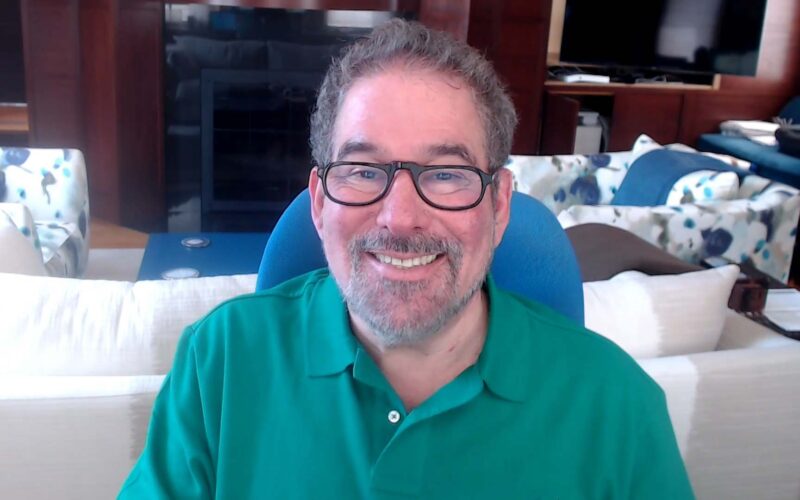It’s now widely accepted that artificial intelligence will transform the tech industry, but which AI use cases will prove the most innovative and impactful remain to be seen.
Generative AI’s potential to completely transform how companies operate at a base level is the core of the AI revolution, according to Alan Trefler (pictured), founder and chief executive officer of Pegasystems Inc.
“We’ve worked since 2012 to bring [customers] statistical AI, the ability to do machine learning and digest numbers,” he said. “But generative AI opens up a couple of new dimensions, that … in addition to statistical AI, enable you to actually be creative in some profound new ways. They are different but very complementary.”
Trefler founded Pega in 1983 after being hired by Dartmouth College to teach computers how to play chess. Since then, Pega’s AI journey has only gained momentum, leading to an environment where generative AI is impossible to ignore.
“The role gen AI is playing … this is not a differentiator,” said Shelly Kramer, managing director and principal analyst at theCUBE Research. “This is a part of your technology solution that absolutely positively has to exist, because if it doesn’t, people are going to go with somebody else.
Trefler spoke with Kramer during an exclusive interview with theCUBE, SiliconANGLE Media’s livestreaming studio, in advance of PegaWorld iNspire. They discussed the upcoming event, which runs from June 9-11 and how Pega is approaching a new world of AI. (* Disclosure below.)
Redefining AI use cases to transform businesses
At Pega’s annual event, PegaWorld, the company will unveil new products focused on AI innovation and automation. While there are a number of AI use cases, such as automating scripts for call centers, Trefler emphasized its more radical impact.
“That’s going to be a highlight of what we do and show at PegaWorld … using generative AI to actually change the fundamental fabric of the processes themselves so that the AI actually builds and improves and optimizes processes,” he said.
Pega recently debuted Pega GenAI Blueprint, which allows work teams to create “blueprints” for applications using generative AI models. Trefler teased more exciting product reveals at PegaWorld, while emphasizing the power of AI to reshape business operations.
“We’re able to use the power of the internet coupled with our best practices that we’ve developed — over the many years we’ve been working on this — to let the system, in literally two minutes, provide you a blueprint for how you might do this,” he said. “It completely changes the way that people envision and re-envision how they want their businesses to work.”
Many are worried about how AI use cases are impacting jobs by automating tasks that were once performed by humans, but Trefler believes that AI will have a more profound impact on the software industry.
“It’s not just being able to generate code, because the world doesn’t need more code,” he said. “It’s the ability to generate structure, the ability to take the business problem we want to solve and put a structure around it, and have that structure then be able to automate the business process.”
Embracing a new ecosystem, powered by AI
AI is already capable of customizing the user experience, with use cases ranging from customer service to personalized shopping. Companies that don’t jump on the AI train are not only at risk of providing a weaker customer experience, but of becoming completely irrelevant.
“Things will be more personal. [Customers] won’t have to deal with generic processes or generic service engagements,” Trefler said. “It’s going to be possible for the organizations that they work with to tailor in a way that has never been possible before. Those organizations are not just going to be empowered to do that; they’re going to have to do that or they’re going to be competitively disadvantaged.”
Regardless of AI’s potential benefits, it will have a seismic impact on the workforce. And that models need to be implemented with guardrails, according to Trefler. Nonetheless, he believes the key to keeping up with changing times is embracing them.
“The fear of losing one’s job is going to, in some cases, be valid. There is going to be a change. But I think it’s much more likely that the person someone loses their job to is another person who understands AI rather than AI itself,” Trefler said. “This is really an empowering tool that people need to get comfortable with. They need to understand the limits, what it’s good at, what it’s not good at.”
Here’s theCUBE’s complete video interview with Alan Trefler:
(* Disclosure: Pegasystems sponsored this segment of theCUBE. Neither Pega nor other sponsors have editorial control over content on theCUBE or SiliconANGLE.)
Photo: SiliconANGLE
Your vote of support is important to us and it helps us keep the content FREE.
One click below supports our mission to provide free, deep, and relevant content.
Join our community on YouTube
Join the community that includes more than 15,000 #CubeAlumni experts, including Amazon.com CEO Andy Jassy, Dell Technologies founder and CEO Michael Dell, Intel CEO Pat Gelsinger, and many more luminaries and experts.
THANK YOU
Source link
lol

